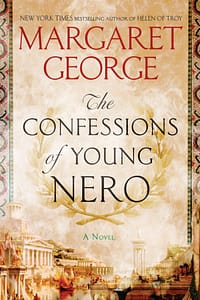

Thanks to Lauren Burnstein of Berkley Books, I am giving away one print copy of Confessions Of Young Nero by Margaret George.
Description of Confessions Of Young Nero by Margaret George
THE CONFESSIONS OF YOUNG NERO (Berkley Hardcover; March 7, 2017; $28) is written, like Robert Graves’s I, Claudius, in the form of an autobiography. It reveals with luminescent detail Nero’s complex talents and successes, his childhood, his rise to power, and his instinct for self-preservation which first took root on the moonlit night his insane uncle, the Emperor Caligula, tried to drown him.
Nero’s life—riddled with murders, rivalries, plots, orgies, and incest—is sensational on its own. But for George, THE CONFESSIONS OF YOUNG NERO is not just an opportunity to tell his story. It is an attempt to rehabilitate his image, and to expose the truth and complexities about both a man—and a time period—that has been much mythologized. George spent five years researching the novel, but her idea of resetting Nero’s villainous reputation has been building for more than thirty.
When he is just a small child, Nero’s mother, Agrippina, is released from exile by her elderly uncle—the newly crowned Emperor Claudius. Agrippina quickly plucks Nero from his modest upbringing, and embarks on a ruthless pruning of the family tree to ensure what she believes is her son’s rightful place in the Palace. Her naked ambition, cunning, and well-placed doses of poison help the obstacles fall one by one, until a teenage boy is given control of an Empire. Both tempted and terrified to assume his reign, Nero’s indoctrination into the incest, violence, luxury, and intrigue that have gripped Rome’s seat of power for generations will shape him into the man he was fated to become.
George covers the unfolding of Nero’s life and legacy, including his forced marriage to his cousin Octavia at fifteen; his passion for a beautiful ex-slave and other love affairs; the influence of the great philosopher Seneca on his reign; and his attentiveness to his political duties, including the improvement of Rome’s courts and public amenities. George uses Nero’s expansion of theatres, athletic games, chariot races, and musical performances as a window into the powerful artistic and athletic impulses that governed him, and which made him a champion of the common man—the men among whom he’d begun his life as “Lucius,” until fate made him forever “Nero.”
Like Mary Beard’s revisionist history of ancient Rome, SPQR, NERO both challenges our assumptions of that time period and taps into readers’ fascination with the Empire. Readers of Philippa Gregory will adore and find much to discover in George’s latest novel.
The author will continue Nero’s story in a second book, which picks up during the ill-fated, final four years of his young life, as he faces his biggest test and challenge: the Great Fire of Rome.
Praise for Margaret George
“If only history lessons had been like this.”—Cosmopolitan
“Extensively researched with the highest integrity, and deeply engaging, it sets a new benchmark for the genre.”—New York Times bestselling author Alison Weir
“George leaves us with the most coveted prize of fiction: a world. . . we wished existed, and that thoroughly does between the covers.” —Chicago Tribune
About Margaret George
(c) Alison Kaufman
Margaret George is the New York Times bestselling author of six novels of biographical historical fiction, including Elizabeth I, Helen of Troy, Mary, Called Magdalene, The Memoirs of Cleopatra, The Autobiography of Henry VIII, and Mary Queen of Scotland and the Isles. She also has written a children’s book, Lucille Lost.
Giveaway of Confessions Of Young Nero by Margaret George
This giveaway is open to the U.S. only and ends on April 1, 2017 midnight pacific time. Entries are accepted via Rafflecopter only.